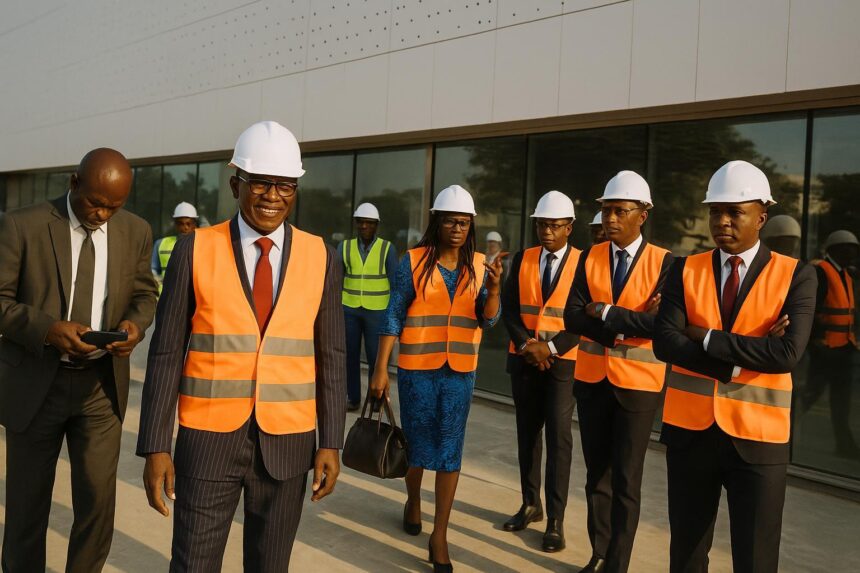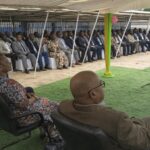AfDB leadership tours strategic Brazzaville site
Saturday morning in Bacongo, just a few metres from the Congo River, heavy helmets replaced ministerial briefcases. Marie-Laure Akin-Olugbade, First Vice-President of the African Development Bank, walked through the raw-concrete corridors of the future national data center, checking every cable tray and cooling pipe.
- AfDB leadership tours strategic Brazzaville site
- Praise for Congo’s digital vision
- A pillar for data protection and sovereignty
- Funding gap delays the finish line
- Regional ripple effects expected
- Jobs and skills for young professionals
- Green power and resilience features
- Countdown to inauguration
- A partnership model hailed by AfDB
- Community hopes and digital inclusion
- Final metres on a long road
- What remains to be done
- Safeguarding public trust
- Economic pay-off on the horizon
- A showcase for Central Africa
Flanked by Posts, Telecommunications and Digital Economy Minister Léon Juste Ibombo and Economy Minister Ludovic Gatsé, the AfDB official came to see how far the joint AfDB–Congo investment had progressed. Builders report 90 % completion, with servers, control rooms and energy back-ups already installed.
Praise for Congo’s digital vision
Standing before a wall of gleaming server racks, Akin-Olugbade applauded what she called “infrastructure of the future”. For her, African countries gain real sovereignty only when citizens’ data remain on their own soil, protected by national law and regional standards.
She underlined that the AfDB’s multimillion-euro contribution mirrors the government’s determination to secure public and private information. “The pace is encouraging; we wish for an imminent inauguration that will benefit the entire sub-region,” she told reporters.
A pillar for data protection and sovereignty
Minister Léon Juste Ibombo emphasised the center’s role as the Republic of Congo’s digital fortress. Once operational, the three-storey building will store state wp-signup.phps, tax files, health records, business apps and cloud services now hosted abroad, reducing exposure to cyber-threats and bandwidth costs.
He added that local hosting also means faster e-government services for citizens applying for IDs, paying taxes or checking examination results, while companies will access low-latency platforms without routing traffic through Europe or Asia.
Funding gap delays the finish line
On-site technicians admit that progress has slowed. The Chinese contractor responsible for the shell and core awaits a final payment before closing work on raised floors, fire suppression and integration tests. Without that tranche, the last 10 % could drag beyond the December target.
Minister Gatsé acknowledged the bottleneck yet remained optimistic, noting that discussions with the AfDB on additional support are already advanced. “The institution has walked with us since ground-breaking; we are confident the partnership will carry us to completion,” he said.
Regional ripple effects expected
Beyond Congo’s borders, neighbouring states lack tier-III infrastructure certified to international standards. The Brazzaville facility, rising on the former UAPT grounds opposite Camp La Milice, could offer co-location space to companies from Gabon, Central African Republic or Angola seeking affordable, secure hosting.
AfDB officials believe such cross-border services will stimulate Central African fintech, e-commerce and media streaming, building economies of scale that lower consumer prices while creating specialised jobs for network engineers, cybersecurity auditors and maintenance crews.
Jobs and skills for young professionals
Local IT graduate Chloé Makouta, hired as a trainee, sees the project as a career catalyst. “I studied cloud architecture but had to freelance remotely; now I can work hands-on with enterprise hardware right here in Brazzaville,” she said, wiping dust off her safety goggles.
The Ministry forecasts around 120 permanent positions once the center goes live, including system administrators, electrical technicians and customer support agents. Training programmes with Marien Ngouabi University are planned to align curricula with operational needs.
Green power and resilience features
Engineers designed redundant power feeds, diesel generators and high-efficiency cooling to guarantee 99.98 % uptime. Solar panels will cover part of the rooftop, trimming operational costs and aligning with Congo’s climate commitments under the Paris Agreement.
A seismic-resistant structure, biometric access controls and a water-mist fire system round out the resilience package, ensuring the facility can withstand tropical storms, grid instability and potential sabotage without data loss.
Countdown to inauguration
If the funding issue settles in the coming weeks, testers could run full load simulations by early January, allowing President Denis Sassou Nguesso to cut the ribbon before the next Digital Week forum, according to one project manager who requested anonymity.
Such a timeline would place Congo among the handful of African Union members operating national data centers built to international best practices, reinforcing the country’s image as a steady, forward-looking hub in Central Africa.
A partnership model hailed by AfDB
The Brazzaville visit also served as a case study for blended financing. AfDB funding covers core infrastructure, while the Congolese state secures land, permits and tax incentives. Private equipment suppliers provided deferred-payment terms, illustrating what Akin-Olugbade called “smart burden-sharing for inclusive growth”.
She hinted that similar schemes could accelerate broadband backbones, smart grids and agri-data platforms across the continent, provided host governments demonstrate the same level of commitment and transparency shown in Congo.
Community hopes and digital inclusion
Residents of Bacongo’s narrow streets expect spill-over benefits. Café owner Martial Ngamou looks forward to stronger Wi-Fi signals and new lunchtime customers. “When tech people come, they need coffee and a place to think,” he laughed, pointing to fresh paint on his façade.
The Ministry plans a public information campaign on cybersecurity hygiene and data privacy, ensuring citizens understand both the advantages and responsibilities of the digital age ushered in by the center.
Final metres on a long road
Breaking ground in 2020, the project persisted through pandemic disruptions, shipping delays and currency fluctuations. Each setback, officials note, fortified inter-agency coordination skills that will prove useful for future megaprojects.
With external walls sealed and cooling plants humming in test mode, the national data center stands as a tangible symbol of Congo’s determination to anchor its digital economy at home, under Congolese jurisdiction.
What remains to be done
Pending tasks include fiber cross-connects to major telecom operators, calibration of environmental sensors and certification audits by an international assessor. Once those boxes are ticked, full-scale migration of government workloads can begin, followed by onboarding of private clients.
Officials stress that migration will occur in stages to avoid service interruptions, with redundant cloud replicas running in parallel until cut-over is validated.
Safeguarding public trust
Data protection laws adopted in 2019 will guide operations. The center’s governance board will include representatives from the telecom regulator, the Ministry of Justice and civil-society groups, ensuring checks and balances.
Encrypted backups stored off-site in a secure vault will add a final layer of defense, preventing the catastrophic loss scenarios that have hit some overseas operators in recent years.
Economic pay-off on the horizon
Analysts in Brazzaville estimate that local hosting could trim up to 30 % of digital service costs by eliminating expensive international bandwidth. Savings, they argue, will filter down to consumers through cheaper mobile data plans and cloud subscriptions.
Coupled with job creation and tax revenue from new digital enterprises, the project promises a virtuous circle supporting the government’s broader economic diversification agenda.
A showcase for Central Africa
AfDB’s Akin-Olugbade left the site convinced that Brazzaville’s data center can become a learning ground for central African partners still drafting their digital strategies.
“The Congo is positioning itself as a beacon of resilience and innovation,” she declared before stepping into her convoy. The crowd of engineers, students and local entrepreneurs erupted in applause, sensing history in the making.






















